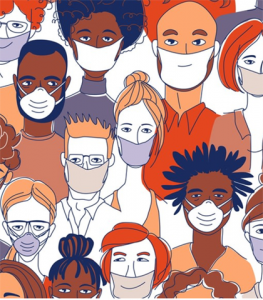COVID translations must be tailored to communities – report
A new report from Monash University says that translated messaging about the COVID-19 pandemic for diverse communities needs to be more nuanced and delivered through familiar networks.
The information also needs to be adapted to the particular characteristics and needs of communities.
 The report, written by a team including Professor of Translation Studies Rita Wilson and Senior Lecturer of Translation Studies Leah Gerber, says that adequate translations must carefully consider the needs of the target audience.
The report, written by a team including Professor of Translation Studies Rita Wilson and Senior Lecturer of Translation Studies Leah Gerber, says that adequate translations must carefully consider the needs of the target audience.
Communicators should consider whether the audience is literate, whether they consume traditional media and who they usually get their information from, it says.
The Monash researchers say that with 26 per cent of Victorians speaking a language other than English (LOTE) at home, the state is a super-diverse multicultural and multilingual society, where the need for language services is high.
And for Culturally and Linguistically Diverse (CALD) communities getting information about the COVID-19 pandemic means being able to access interpreting services.
“CALD communities often prefer to access information through their own networks, as their trust of government authorities may be low,” the researchers said.
They say that after concerns about the accuracy of translated COVID-19 health information in 2020, there was a need for “communities of trust” consisting of people who can communicate sensitively and adapt messages to the particular needs of communities.
“Many translations of COVID-19 information were deemed unacceptable, as they didn’t recognise the diversity within ethnic communities, and failed to prioritise communication tailored for specific target audiences,” the report said.
“Rather than focusing on instances of mistranslation in COVID-19 materials and blaming the translators, the public conversation has broadened to recognise the need for intercultural communication grounded in the practice of intercultural dialogue.
“A core element of interculturally-competent translators is empathy. The emphasis on empathy is all the more relevant because it runs contrary to the dominant expectation of impartiality in professional translation and interpreting practice.
“Moreover, translators and interpreters are both expert communicators and community members; they’re ethically responsible for the impact their translation and interpreting activity has on the lives of people in the real world,” the report said.
Since May 2020, the Victorian government has committed $25.6 million to support Victoria’s multicultural and multifaith communities through the pandemic.
And as attention focusses on the vaccine roll out, there has been misinformation about vaccines circulating around the globe.
As many Victorian CALD community members still consume media from their “home” countries, the potential for such misinformation spreading into local migrant communities is real.
“In a super-diverse city such as Melbourne, where many languages and cultures co-exist, we need to develop a multilingual communication strategy – one that does not let urgency dictate translation quality, but instead focuses on the immediate needs of a multilingual audience,” the report said.
“Successful intercultural communication is difficult to achieve, as it involves verbal and non-verbal messaging,” it said.
”One major, noticeable change in the government’s communication strategy has been the availability of a wide range of COVID-related materials in text, image and video form. For example, English source videos featuring elderly Victorians talking about vaccines have been subtitled into key community languages, and multilingual radio ads have been produced.
“The communication problems encountered during the pandemic highlight the need for better planning in the coordination of intercultural communication so that vulnerable populations with differing languages, norms, beliefs and practices are not forgotten.
“Translations must not only be accurate, but reach those for whom they’re intended. One major barrier is that almost all Australian translated materials are embedded in English-language websites that require users to have English literacy skills in order to access them.
“Materials must not only be translated, but adapted to the specific needs of the community. We don’t really know the extent to which translated materials fulfil their purpose of achieving a level of health literacy and effecting behavioural change among CALD residents,” the report said.
“The communication problems encountered during the pandemic highlight the need for better planning in the coordination of intercultural communication so that vulnerable populations with differing languages, norms, beliefs and practices are not forgotten,” it said.
“A chain of trust between all stakeholders must be established so that we can work together to be better-prepared for future crises,” the report said.
A project funded by the Commonwealth Department of Health is currently assessing these issues.












